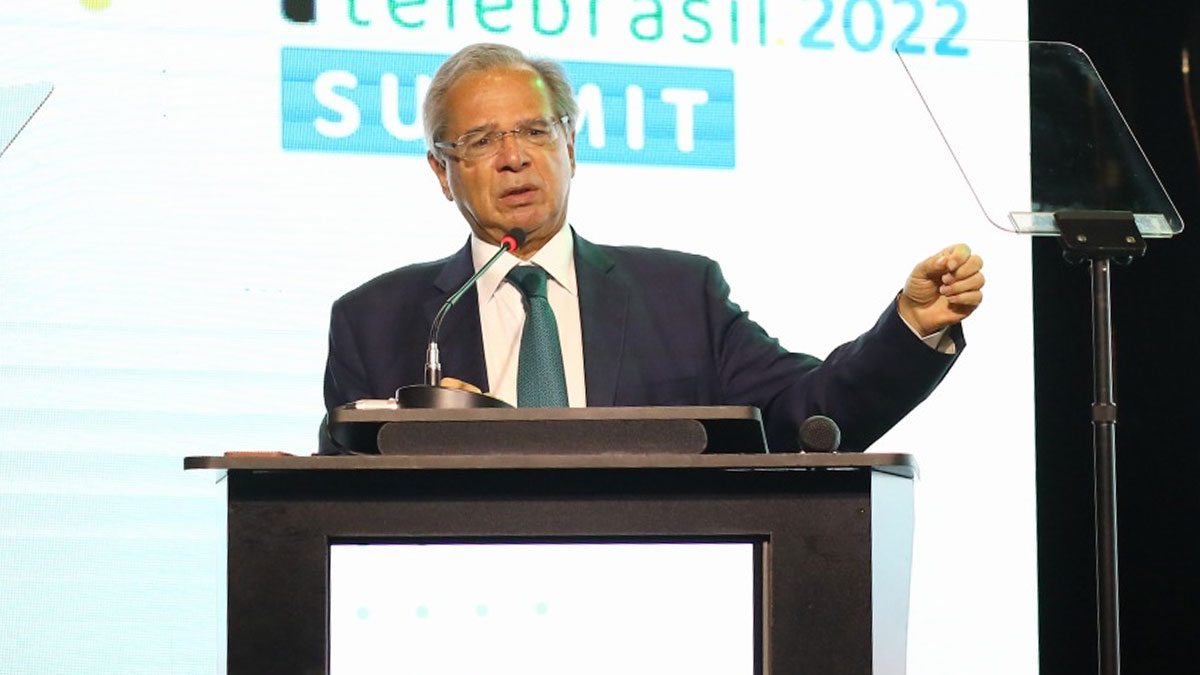RIO DE JANEIRO, BRAZIL – The Brazilian Economy Minister, Paulo Guedes, said today, June 28, that amid a global scenario marked by slowdown and recession, Brazil would go the opposite way, with growth close to 2% in 2022 and 3% to 4% in the following years.
The statement was made during the opening of the Telebrasil Summit 2022 Panel in Brasília.
According to the minister, measures are being planned to significantly reduce taxes on industrial sectors, which should offset the loss of purchasing power of citizens and favor a new cycle of investments in the country.
In his speech, Guedes described extremely pessimistic scenarios abroad and very optimistic ones domestically.

“Inflation has started to rise in the United States, and we will have to live with this. The United States went through a long growth cycle that has come to an end, while we in Brazil are coming out of the rehab center, starting a cycle of 3% to 4% annual growth, which will be for several years if we continue at this pace,” he said.
“Now, don’t be scared by the problems out there. We will have rising inflation in the United States, and we will have a recession. The noise will be deafening. But not for the Brazilian economy, which is one of the most closed economies in the world. We will now reindustrialize Brazil,” he added.
The minister added that Brazil reacted “fulminantly” to the crisis. “We will grow 1.7%, and should almost reach 2% [in 2022].”
“They said the world was going to grow 5%, and they have revised it. They are already talking that there is going to be a recession. They are just beginning to face the problems. We have already managed to get through the wave, and we are going to grow, with unemployment and inflation falling,” Guedes added.
TRANSPORTATION AND TAXATION
Guedes recalled that Brazil has a large amount of ore, which is exported to China, and that the country imports steel 40% cheaper than that produced in the national territory.
According to the minister, the high cost of national production derives, among other factors, from the high cost of cabotage transport, “with six companies exploiting 200 million people,” and the high taxation of the industrial sector.
“The solution for this is to open up the market. Our idea is also to end with the IPI [Tax on Industrialized Products] because the IPI has deindustrialized Brazil,” he added, remembering that the Brazilian government has already reduced this tax by 35%. “We want to lower [the rate] to zero,” he added.
At an event for telecommunications business people, Guedes used examples from the sector to show the effects of this high tax burden on investments and the development of technologies.
“Today, almost 40% of the costs of the telecommunications sector are from taxes, a sector that shows the importance of technology because the rule in Brazil is to tax what is easy, such as fuel, electricity, and telecommunications.
“It destroys the productive equipment in Brazil. That is why we are going to end the taxes [that are levied] on the industry,” said the minister. He pointed out that 100% of the investment for those who bring machines and equipment is deductible.
INVESTMENT CYCLE
Given this context, Guedes predicts that Brazil will start “a long cycle of investment, unlike the world, which is ending a long cycle of investment.”
“Our conversations in Europe, in the United States, with the OECD [Organization for Economic Cooperation and Development] and with the G-20 [a group made up of the finance ministers and heads of central banks of the 19 largest world economies plus the European Union] have convinced us that an avalanche of investment is coming to Brazil if we continue on the path we are on.
“The US Secretary of State has said that, from now on, a requirement for investments in countries is to have close logistics and be friendly. It is the so-called near shore and friend shore,” he said.
Therefore, added the minister, “there is no point in making semiconductors in Taiwan. With the disruption of production chains, the vulnerability of the economic system has become very evident because production has stopped, and the sources are very far away. You have to be close and friendly. And who is this economy close to the United States and Europe? It is Brazil.”
According to the minister, the situation is “inescapable,” with Brazil destined to become Europe’s energy security and the world’s food security. “The world has realized that Brazil is an energy power and a huge consumer market.”
DIGITAL REVOLUTION
Guedes also said that Brazil could not miss the digital revolution the world is going through. “The covid-19 was an acceleration into the future. There emerged the importance of telecommunications, including for agriculture and telecommunications,” he said.
“We cannot miss the digital revolution in this reconfiguration of the production chain. Semiconductors can be made here, and we can enter a new phase in this digital revolution.”
With information from Agência Brasil

